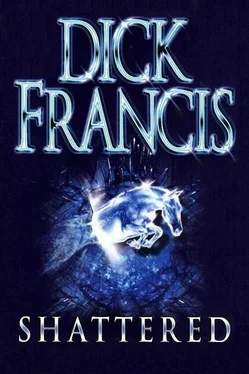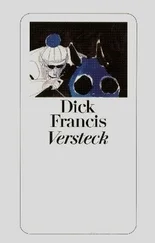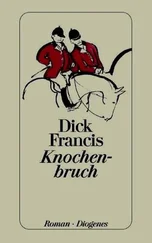Dick Francis - Shattered
Здесь есть возможность читать онлайн «Dick Francis - Shattered» весь текст электронной книги совершенно бесплатно (целиком полную версию без сокращений). В некоторых случаях можно слушать аудио, скачать через торрент в формате fb2 и присутствует краткое содержание. Город: London, Год выпуска: 2000, ISBN: 2000, Издательство: Michael Joseph, Жанр: Детектив, на английском языке. Описание произведения, (предисловие) а так же отзывы посетителей доступны на портале библиотеки ЛибКат.
- Название:Shattered
- Автор:
- Издательство:Michael Joseph
- Жанр:
- Год:2000
- Город:London
- ISBN:978-0-7181-4453-1
- Рейтинг книги:4 / 5. Голосов: 1
-
Избранное:Добавить в избранное
- Отзывы:
-
Ваша оценка:
- 80
- 1
- 2
- 3
- 4
- 5
Shattered: краткое содержание, описание и аннотация
Предлагаем к чтению аннотацию, описание, краткое содержание или предисловие (зависит от того, что написал сам автор книги «Shattered»). Если вы не нашли необходимую информацию о книге — напишите в комментариях, мы постараемся отыскать её.
Shattered — читать онлайн бесплатно полную книгу (весь текст) целиком
Ниже представлен текст книги, разбитый по страницам. Система сохранения места последней прочитанной страницы, позволяет с удобством читать онлайн бесплатно книгу «Shattered», без необходимости каждый раз заново искать на чём Вы остановились. Поставьте закладку, и сможете в любой момент перейти на страницу, на которой закончили чтение.
Интервал:
Закладка:
I gave him the book I’d taken along for the purpose, which contained a series of glossy colored eight-by-ten photographs, a long record of the work I’d done over maybe twelve years.
I explained that I couldn’t in good faith repeat any of the items exactly, but I could make something similar, if he liked.
He laid the book flat on a big table and turned the pages slowly. It mattered to me quite a lot, I discovered, that he would like at least some of the pieces, even if half of them weren’t suitable for racing trophies. Vases of odd shapes had recently been blown for trophies of all sorts, though. There was no ban these days on anything surreal.
Trubshaw finished turning the pages. Then he closed the book, to my severe disappointment, and with too serious a tightening of his mouth gave me his verdict.
“If you can lend me this book I’ll put it before the committee when they meet tomorrow morning. I know dear Marigold wants action. I will telephone her when the decision’s made”
I’ll be damned, I thought. How did he look when he was altogether turning things down?
He said, “The leaping horse is the one I’d choose. Can you do anything like it? And I’ll need to know how high it would be overall, and how heavy. The one in the photograph looks too big.”
“Any size you like,” I promised, and told him that the leaping horse in the picture belonged to one of the Leicester races Stewards and his wife.
While Kenneth Trubshaw exclaimed with surprise I recalled minute by minute as best I could the conversation I’d had on the Stewards’ friends’ viewing balcony, where Lloyd Baxter had first told me about a white-bearded man stealing my money along with the much traveled videotape.
Lloyd Baxter, with his epilepsy, couldn’t be factor X. His body hadn’t the shape or the agility of Blackmask Four.
Kenneth Trubshaw put his hand down on the book of photos and said thoughtfully, “Could you include enough gold to satisfy Marigold?”
“Yes. Any amount.”
“Er... how? And would it be... well... enormously expensive?”
“Not very expensive.”
Kenneth Trubshaw held definite reasons for concerning himself and his committee members with the subject of cost, but he hesitated for a measurable time before he waved me to a chair, and, sitting himself, said, “I don’t know if you follow the background ins and outs of racing politics at all? I don’t mean the form of horses or speculations about their fitness, I mean the question about whether the cost of a winner’s trophy should be deducted from the prize money, as it usually has been until recently. Many owners refuse to take the trophy, preferring the whole prize to be given as money. It’s being suggested that we give the whole prize and the trophy in every case. Ask Marigold if she is giving the trophy herself outright, or if she expects the racecourse to pay for it. Warn her the debate exists.” He stopped slowly, not proud of his shunting of his dilemma onto me.
“Well... all right,” I said. “But don’t expect Marigold to decide. She’s terrific, but she leaves life’s really serious decisions to her chauffeur.”
“You don’t mean it!”
“Of course I do. Her chauffeur, Worthington, is worth his weight in cut crystal ten times over.”
Kenneth Trubshaw absorbed the news manfully and then with relief went back to straight expense, saying, “The necklace Marigold wants is very expensive, isn’t it?”
I nodded. “Very. And that necklace, if on public show, is inviting thieves. The gold is genuinely solid in that case.”
“Isn’t solid gold always the real thing?” He looked quizzical.
I explained, “Well... you can paint hot glass with molten eighteen-carat gold, that’s seventy-five percent pure gold mixed with other metals. You paint what you want to look gold when it’s finished. Then you anneal the work for a second time, but only at 450 degrees Fahrenheit, and when it cools the second time the gold you painted on will have adhered completely to the glass, and it will look like solid gold, even if it isn’t.”
Kenneth Trubshaw was fascinated, but didn’t want to be considered cheap. “Gold has to be gold,” he said. “I want Marigold to like it, of course. That is, if we decide on this sort of thing for her trophy.”
I made murmuring agreeing noises.
He asked curiously, “What of all those sculptures in the book was the hardest for you to make?”
“The most difficult was the gypsy’s crystal ball.”
It surprised him, as it did most people. He thought a crystal ball was blown up like a child’s balloon.
“No,” I said. “It’s solid glass. And it’s extremely difficult to make a perfectly round large ball of glass without air bubbles forming in it as it cools in an annealing oven.”
He wanted me to enlighten him about annealing, and when I told him, he said, “Could you make a leaping horse taking off from a crystal ball?”
Nodding, I said, “It would be heavy... and difficult... but I could make sure it was unique.”
He pondered for a while, walking to his tall sash windows and looking out into his sleeping winter garden.
“If we decide on giving you the commission, can you make drawings for us to choose from?”
“Yes,” I said, “I could. But actually I’ll probably make examples in glass. I’m more at home that way. Glass itself isn’t expensive, and if you don’t like the things I make, I can sell them in the shop.”
He smiled with irony at my frugal business sense. My chances, I judged, weren’t much more than fifty-fifty.
Kenneth Trubshaw collected my crew from his kitchen and lined them up in an elegant striped nineteenth-century hall. Carefully then he looked them over. I followed his gaze and also his mind: a tubby driver in a wrinkled gray suit, a thin anxious boy, a piratical-looking vigorous man with a black pointed little Elizabethan beard, and three large black Dobermans with watchful eyes and uncertain moods.
I said to Ken Trubshaw with a smile, “They’re my barbed-wire fence. Don’t expect them to be pretty as well.”
He glanced my way, then said, “It isn’t enough for you and Marigold to make, pay for and give a splendid trophy to the winning owner of a race in memory of Martin Stukely.” He stopped for reconsideration. “At least, it’s enough for that great lady Marigold, but not for you.”
He opened his front door for my guys to leave. Tom Pigeon bowed to him with ceremony, his glimmering smile making a mockery of solemnity. His dogs crowded his ankles to give him honor, and the manager earned Tom’s allegiance forevermore by bowing back to him in return.
The Trubshaw hand on my arm again made me stay, while the others trooped out to the car. He said, “Martin Stukely’s darling widow may not realize that his good name is in doubt just now. Marigold certainly doesn’t, nor does the racing public; nor, thank God, does the racing press. But you do, don’t you? I saw it in your reaction to Marigold’s enthusiasm for a race in his memory. You need, don’t you, to scrub clean his honorable reputation first?”
I felt a chilled moment of disbelief that anyone else besides myself had perceived the possibility that Martin could have been knowingly dishonest.
There had been the moment when, reading through the contents of the slim hard-to-find drawer in his desk, I’d had to face the unwelcome photocopy of the letter he had written to Force. Parts of that short note had reverberated in my awareness ever since.
“... your formulae and methods... record onto a videotape... and give it to me at Cheltenham races.”
Martin had known precisely what was on that tape. Had he after all known all along that the formulae and methods had been stolen? Kind George Lawson-Young had given his assured conviction that Martin had been one hundred percent innocent in his dealings with Force. Terrible doubts all the same remained, and I didn’t like finding them alive in the Cheltenham hierarchy.
Читать дальшеИнтервал:
Закладка:
Похожие книги на «Shattered»
Представляем Вашему вниманию похожие книги на «Shattered» списком для выбора. Мы отобрали схожую по названию и смыслу литературу в надежде предоставить читателям больше вариантов отыскать новые, интересные, ещё непрочитанные произведения.
Обсуждение, отзывы о книге «Shattered» и просто собственные мнения читателей. Оставьте ваши комментарии, напишите, что Вы думаете о произведении, его смысле или главных героях. Укажите что конкретно понравилось, а что нет, и почему Вы так считаете.












